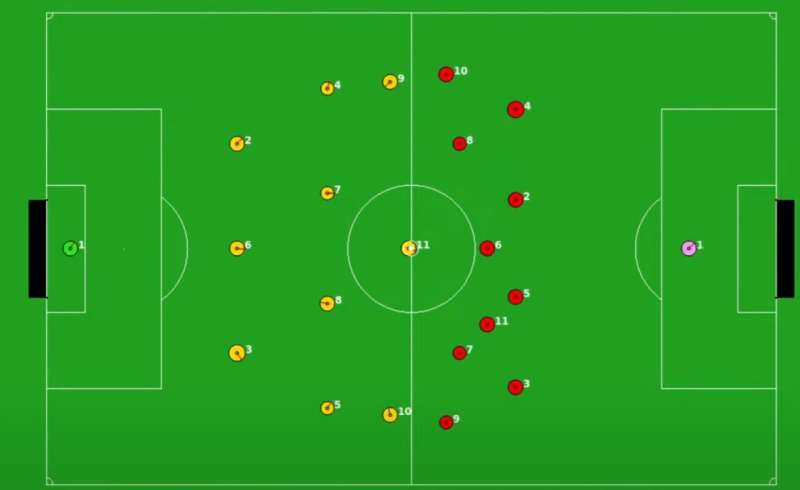August 17, 2023 feature
This article has been reviewed according to Science X's editorial process and policies. Editors have highlighted the following attributes while ensuring the content's credibility:
fact-checked
preprint
trusted source
proofread
An open-source and Python-based platform for the 2D simulation of Robocup soccer

RoboCup is an international annual event designed to showcase advances in the fields of robotics and artificial intelligence (AI). At this event, different teams of humanoid robots play soccer against each other,
Every year, roboticists and computer scientists worldwide set out to develop robots and algorithms that could be presented at RoboCup. Before they are tested in real-world environments, however, most of these systems are run and evaluated in simulations, to fine-tune their performance.
Researchers at Dalhousie University and Memorial University of Newfoundland in Canada recently introduced Pyrus Base, a new open-source Python-based platform for the two-dimensional (2D) simulation of RoboCup soccer. This platform, introduced in a paper published on pre-print server arXiv, could help researchers to train and test their robotic soccer-related algorithms both easily and reliably.
"The paper is about a base code developed in Python for researchers interested in AI and Robocup Soccer Simulation 2D environments," Aref Sayareh, one of the researchers who carried out the study, told Tech Xplore. "Since there are powerful frameworks in Python, we created this base code to make it easier for researchers to develop their ideas in this multi-agent environment."
Most existing frameworks for running robotic soccer simulations, including HeliosBase and Cyrus2DBase, utilize the programming language C++. While C++ has many advantages, for instance simplifying the adaptation of the same code for different uses, it is quite advanced compared to other programming languages, such as Python.
As a result, simulation platforms based on C++ can typically only be used by those with a good knowledge of programming. Sayareh and his colleagues set out to develop an alternative framework based on Python that could be used by a broader range of users with varying levels of technical expertise.
"We made our base as simple as possible, with many functions and classes that let researchers focus only on their idea rather than complicated math and programming," Sayareh explained. "Also, frameworks like Tensorflow and PyTorch are straightforward in this base code. In addition, Pyrus' structure is very similar to C++ base codes, so people with high experience in this league can use the Python base easily."
Pyrus base is a simple and accessible 2D simulation platform that allows even beginners or inexperienced programmers to test AI models for RoboCup. The researchers hope that their platform will encourage more researchers to test their ideas, fueling innovation in the field of robotic soccer.
"The soccer simulation 2D league in Robocup is a multi-agent and noisy environment focusing more on offensive and defensive behaviors," Sayareh said. "Therefore, AI can play a significant role in this environment. For example, using reinforcement learning methods, agents can learn behaviors such as dribbling or passing or some machine learning methods that can reduce the environment's noise."
The Pyrus base code is already available on GitHub and could soon be downloaded and used by robotics enthusiasts and research groups worldwide. In their next works, Sayareh and his colleagues hope to further improve the framework, so that it can be used to train an even larger pool of AI algorithms.
"We will now optimize the Pyrus base to improve its performance," Sayareh added. "Also, we will add some informative reinforcement learning examples, such as goalie with reinforcement learning, to the base code for researchers and newcomers to this league so they can learn easier and faster. "
More information: Nader Zare et al, Pyrus Base: An Open Source Python Framework for the RoboCup 2D Soccer Simulation, arXiv (2023). DOI: 10.48550/arxiv.2307.16875
© 2023 Science X Network


















